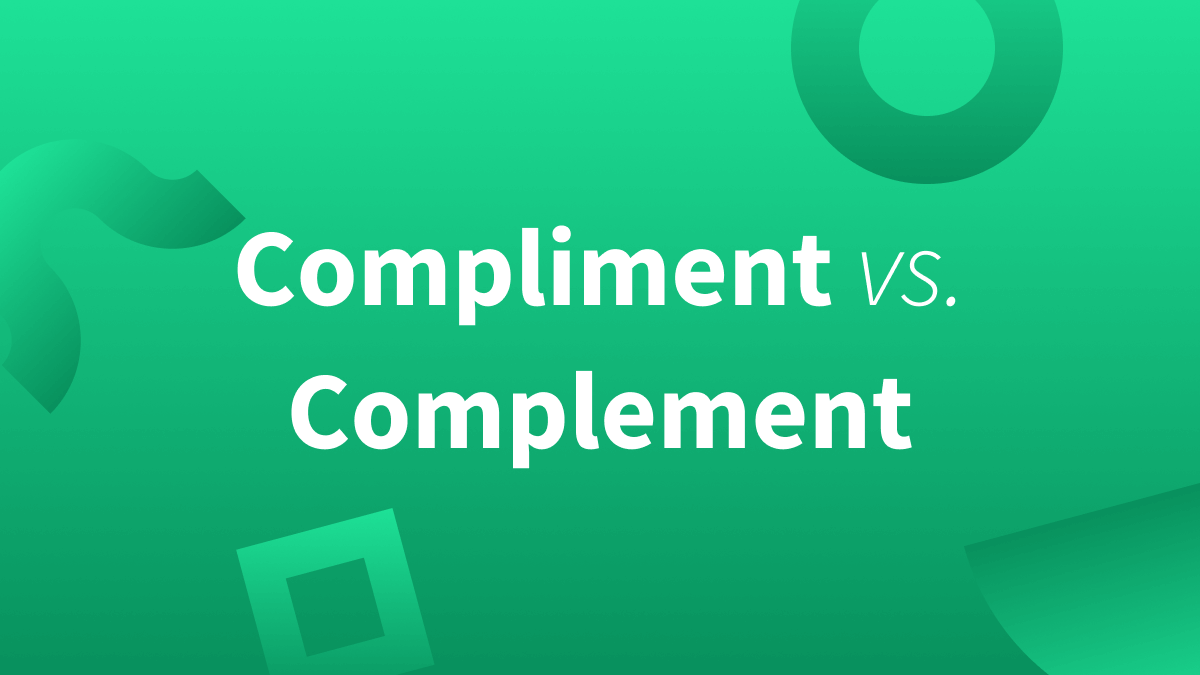- As a noun, compliment means “a polite expression of esteem, admiration, or affection.”
- When used as a verb, compliment means “to express praise, respect, or affection.”
- As a noun, complement means “something that completes or makes better.”
- When used as a verb, complement means “to complete or add to something in a way that improves it.”
- ○ Send my compliments to the chef. Dinner was great.
- ○ I wanted to compliment Diana on her beautiful dress.
- ○ The shoes were the perfect complement to the entire outfit.
- ○ The earrings really complement your blue eyes.
What’s the Difference Between “Compliment” and “Complement”?
It’s Friday night, and you have a brand-new outfit. You put it on, and not only do you look great, but you feel great. There’s just one thing missing. But, is it a compliment or complement?
That depends. If you think the outfit is perfect as is, and all it’s missing is praise from your friend, then what you want is a compliment like, “Wow, your outfit is spectacular!” But, if you think your outfit is missing something that can make it that much better, then what you want is a complement, like an accessory that completes the whole look.
Compliment and complement are homophones—words that are pronounced the same but have different meanings. That’s why many people use these two words incorrectly. But don’t worry. Below, we’ll go over the definitions of compliment and complement and teach you how to use them correctly.
When To Use “Compliment”
Compliment /ˈkɑːmplɪmənt/ can be used as a noun and a verb.
As a noun, compliment is a “polite comment that expresses praise, affection, or admiration to someone or something.” For instance, if you tell your dad that dinner was delicious, then what you said was a compliment.
Here are some more sentences with compliment being used as a noun:
I took it as a compliment that they wanted me to be the lead speaker.
Connie was flattered by all the compliments she received after her performance.
Jordan said her teacher gave her a compliment on how well she played the piano.
So, when someone wants to pay you a compliment, that means they would like to praise you for something. Additionally, if someone aims to return the compliment, that means they intend to repay a favor or treat you as you have treated them (in a positive sense).
As a verb, compliment means “to praise someone or express affection or admiration.” In other words, when you give someone a compliment, you are complimenting them.
I wanted to compliment Yenil on her achievements.
Edward complimented Eric on his new watch.
Camilo said he always gets complimented when he gets a fresh haircut.
We should note that when something is complimentary, that means it’s free.
The hotel we booked offers complimentary breakfast.
When To Use “Complement”
Complement /ˈkɑːmplɪment/ can also be used as a noun or a verb.
As a noun, complement is “something that completes or improves something else.” At some restaurants, the menu will tell you which wines serve as complements to a specific entrée.
The Cabernet is the perfect complement to the New York Strip.
We wanted the artwork to serve as a complement to the rest of the apartment.
Layla said the heels were the complement the dress needed.
As a verb, complement means “to add to, enhance, or improve something.”
The frame complements the photograph.
Juliana said she was looking for earrings to complement her new glasses.
They were looking for a teammate who would complement the rest of the team.
LanguageTool Complements Your Writing
If you’ve reached the end of your text, but need something else to complement it, try LanguageTool. This multilingual text editor will enhance your writing by suggesting formatting improvements and also providing synonyms. Your flawless text is sure to receive tons of compliments.

